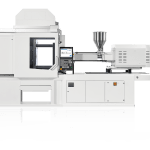
Machine, automation, tools, controllers, raw materials – an entire optimised production solution customised to medical technology applications featuring comprehensive networking and digital quality control.
Sumitomo (SHI) Demag Plastics Machinery GmbH is presenting a fully automated and highly efficient production cell for medical technical parts at Fakuma 2021. In the spotlight is the all-electric IntElect S 100/460-250 injection moulding machine, featuring an automation system from Waldorf Technik GmbH, Engen, and based on their patented Vario Tip FSS system. This trade fair exhibit was designed specifically to produce medical insulin syringe caps on a 16-cavity mould in a six second cycle time.
FSS stands for Floor Space Saving and encapsulates the significantly reduced space delivered in this Vario-Tip construction compared to a standard model. Nevertheless, its high functionality and variability remain. The system is characterised by its unsurpassed freedom to accommodate various tool configurations and packaging units. Additionally, it includes a variety of unique customer-specific features that can be applied.
Immediately after removing the caps from the injection moulding machine, the removal gripper transfers them in order. The caps are sequenced according to the cavity numbers into a sliding table and from there placed into racks, maintaining the sorting of each individual cavity. Anatol Sattel, Director Business Development Medical describes the process: "After filling, the parts are checked for possible damage using a Kitov camera. At the point of ejecting all 16 parts, the system features a Quality Assurance (QA) station. A Sawyer cobot then waits at the outlet of the system and removes the filled racks from the system."
The automation system is completed with the integration of the Smart Services EVE Suite from Hahn Digital, a subsidiary of the Hahn Group, Rheinböllen. This innovative solution supports customers with their digital transformation and smart manufacturing strategies. One component, EVE Analytics allows for the monitoring of plants across multiple locations in real time. Creating individual dashboards, independent process and machine data is captured, with further analysis options available.
By using EVE Analytics, downtime can be massively reduced. Targeted real-time notifications and location-independent status updates enable faster responses. "Data analysis and KPI-based dashboards guarantee efficient monitoring," says Sattel. The system automatically performs a data analysis of correlations and deviations from the optimal settings. With the help of predictive analysis, data can be used to gain insights to maintain a continuous production output.
Digitalisation project for comprehensive quality control and traceability of components
"Particularly in the field of medical technology, comprehensive quality control and traceability of parts production are indispensable," explains Anatol Sattel. “Our digitisation project more than meets these requirements. We are currently working on the development of an IoT dashboard that will enable data analysis and visualisation, transfer and storage of know-how, maintenance planning and prediction. In addition to guided assistance system providing clear steps, other autonomous functions will also be incorporated."
According to Sattel, cycle- and time-dependent data can be collected via the machine interface and mapped via an App-based dashboard. Initially, these can be used for data server storage, the creation of KPI dashboards, the visualisation of live data, and to display historical data and trend analysis. Additionally, a troubleshooting guide helps with solving and evaluating process deviations.

Looking to the near future, Sumitomo (SHI) Demag plans to develop assistance Apps - a system for setting up and optimising processes, introducing a material and knowledge library, as well as integrating simulation tools for advanced settings and deeper insights into the processes. "Our vision is an intelligent machine that can independently make predictions about part quality, machine wear and failures and perform optimisations online," says Sattel. "This enables process consistency to be increased, improvement in product quality, and maintenance to be adjusted accordingly."
Increased capacity of energy recovery system ensures even better efficiency
The first results of the digitisation project are impressively illustrated on the all-electric IntElect S 100t machine at the Fakuma booth (B1-1105). At the same time, this showcase demonstrates Sumitomo (SHI) Demag’s competence in mass-producing medical applications with extremely tight tolerances. The high-precision direct drive technology ensures more precision and repeatability, resulting in higher quality medical components. The system is particularly clean, cool, fast and quiet.
Energy efficiency and total cost of ownership (TCO) are also significantly improved by the high-performance drives, confirmed by comprehensive lifetime tests on the machines and components. Spindles tested under the harshest conditions showed no signs of visible wear even after millions of cycles. "Increasing the capacity of our energy recovery system has not only improved efficiency, but also increased the longevity of the IntElect’s electrical components," explains Sattel. Additionally, improved temperature control of the spindles, motors and inverters helps to ensure safe operation of the machine, even in the most demanding applications.
"Due to the more constant operating temperature, energy consumption is lowered with less heat needing to be dissipated from air-conditioned environments," the expert reports. "Longevity and energy efficiency are decisive factors towards achieving our Act! Sustainably ambitions. Sumitomo (SHI) Demag is committed to developing future sustainable innovations by manufacturing machines that contribute to this. Ecological and environmentally conscious awareness is part of this corporate social responsibility blueprint," states Sattel.
Additionally, the Medical Business Development Director highlights another important aspect. In order to comply with the explicit quality management and validation ISO 13485 standards for medical devices, new machine user parameters have been introduced. Processes are kept within certain bandwidths and operators cannot, without permission, make any adjustments to pressure, temperature, flow and cooling rates. "Adhering to the validated injection moulding processes for medical applications," adds Sattel.



